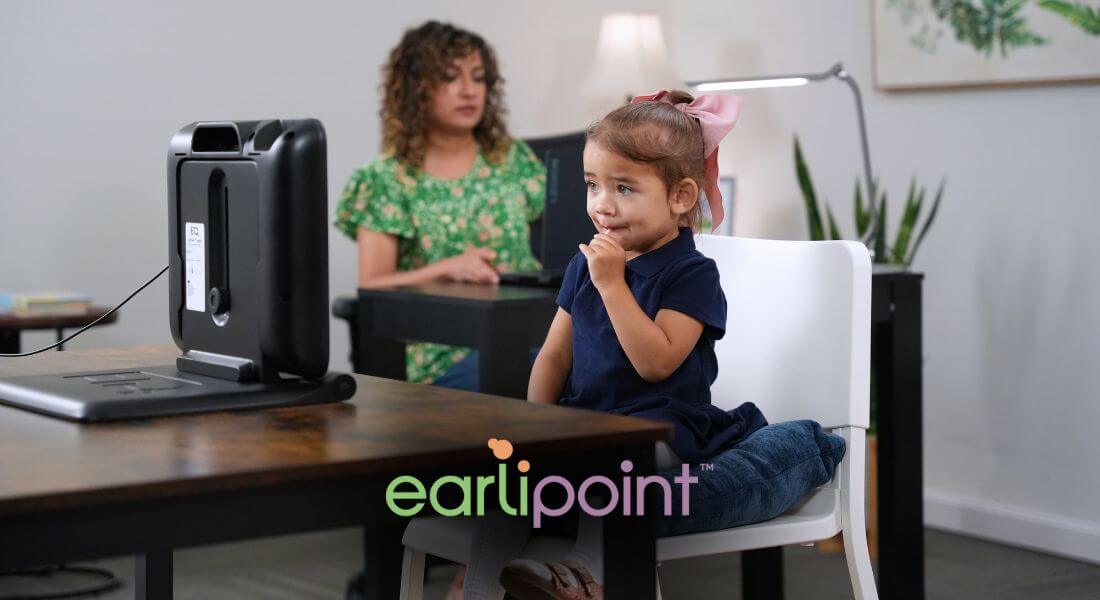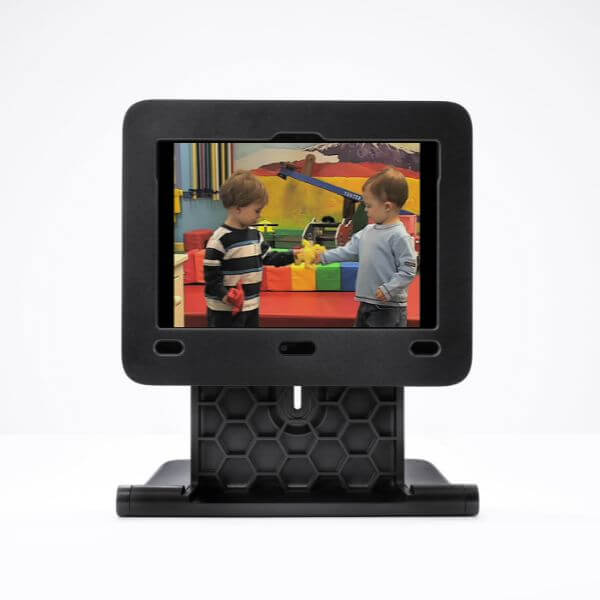Hopebridge Partners with EarliTec Dx to Provide Objective Autism Assessment for Babies and Toddlers
July 29, 2024
July 29, 2024

At Hopebridge, our families have seen first-hand how much early identification of autism spectrum disorder (ASD) can affect a child’s development. When it comes to reaching milestones and building communication and foundational life skills, every day counts, so we are constantly looking into better, more efficient ways to support our families on this journey.
Most recently, we partnered with EarliTec Diagnostics Inc. to broaden our work in this area and give young children in Atlanta opportunities for more objective evaluations for autism. Through this pilot program, Hopebridge licensed clinical psychologists utilize EarliPointTM, an innovative, new approach to identifying autism through FDA-authorized technology that uses eye-tracking to measure and quantify social visual engagement.

EarliPoint™️ is a tablet-based medical device that uses eye-tracking technology to measure and quantify social visual engagement.
With 1 in 36 children in the United States diagnosed with ASD, awareness and identification has expanded over the years, but there is still more work to do. On average, children who are able to get an evaluation are often already of preschool age when they receive a diagnosis, even though studies show earlier screening can have a greater impact on clinical outcomes.
The American Academy of Pediatrics (AAP) recommends autism screening at 18 months and 24 months. If the screening suggests signs of autism, the next step is a diagnostic evaluation. As part of Hopebridge’s partnership with EarliPointTM, we are currently using the tablet-based medical device for support with diagnostic evaluations in our pediatric therapy center in Suwanee, Georgia for children 16 to 30 months old.
EarliPointTM aids in early and efficient autism diagnosis and assessment by serving as an objective biomarker for autism, free from race or ethnic bias, detecting autism at the speed of a child’s glance. While watching a series of short video scenes of social interactions, the technology monitors looking behavior to measure the three core domains of autism, including social disability, verbal ability and non-verbal learning.
“Early identification and intervention are key and this innovation allows us to perform evaluations for babies and toddlers in the Atlanta community with an objective measure in addition to the industry standards, which have the risk of some subjectivity,” said Hopebridge Chief Clinical Officer Jana Sarno. “We are encouraged by what we have seen in the initial results of our pilot using EarliPoint in our evaluations and what it could mean for opening access to assessment and treatment services, not only at Hopebridge, but for families and providers across the country.”
Research shows that EarliPointTM correctly identifies autism in four out of five children. One of several tools our Georgia diagnosticians use within Hopebridge’s range of autism assessments to provide a diagnosis, EarliPointTM is not intended to be used in isolation. Instead, it is incorporated alongside additional measures administered by a licensed psychologist, including a clinical interview, behavioral observations, direct assessments of the child’s behaviors, and a parent report.

EarliPoint Device for autism diagnosis.
“Our collaboration with Hopebridge offers physicians and caregivers a trusted partner that can perform this important work to provide objective answers for children at an age when their brain is the most receptive and the most gains can be made,” said Thomas Ressemann, Chief Executive Officer, Earlitec Diagnostics, Inc.
Hopebridge’s involvement in this partnership stems from its relationship with the Marcus Autism Center, a part of Children’s Healthcare of Atlanta, which played a significant role in the research that was pivotal in obtaining FDA approval for EarliPointTM. Our chief clinical offer, Jana, previously served her internship at Marcus when this technology was in its early stages.
“The Marcus Autism Center holds a place in my heart as part of my professional journey, so I continued to follow my colleagues’ research and the evolution of this technology,” said Jana. “We all want an objective assessment that can be delivered in a quick and reliable way to provide a diagnosis of autism, and I’m excited for Hopebridge’s collaboration in this diagnostic advancement.”
The real impact of this program at Hopebridge is yet to be determined, but goals include improving autism identification and informing treatment outcomes through services like applied behavior analysis (ABA), occupational therapy and speech-language therapy.
As one of the largest autism therapy healthcare providers in the nation, the pilot with EarliPointTM in Georgia is one of Hopebridge’s many steps towards advancing science for the autism community.
If you are a physician who is interested in referring patients to Hopebridge for diagnostic testing or other pediatric therapy services, please visit hopebridge.com/physician-referrals. Or, if you’d like to work more directly with our children through Hopebridge’s collaborative, interdisciplinary approach, please consider open role listed at jobs.hopebridge.com in locations across the country.
If you are looking for autism testing or other pediatric autism services for your own child, we welcome you to visit hopebridge.com/contact so we can help your child – and you! – live your best life possible.
*Informed consent was obtained from the participants in this article. This information should not be captured and reused without express permission from Hopebridge, LLC.
Autism Therapy
July 12, 2018
What is the Impact of Early Intervention on Children with Autism? - Ask Kim Video Series
Autism Therapy
April 24, 2018
Hopebridge Researchers Create New Approach for Teaching Hygiene
Autism Therapy
September 13, 2019
How do you Keep my Child Safe During Autism Therapy? Learn from a Hopebridge BCBA